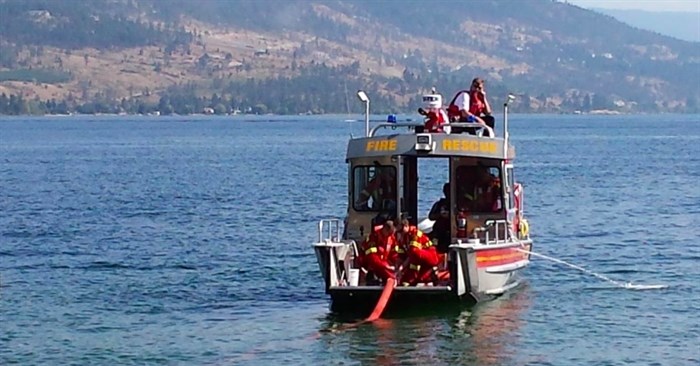
This is the North Westside Fire Rescue boat that had to stop pumping water to firefighters in order to rescue people who had refused to obey the evacuation order near Killiney Beach.
Image Credit: Submitted/Regional District of Central Okanagan
August 21, 2021 - 7:00 AM
Water supplies from Okanagan Lake were abruptly cut off during the worst of the battle against the White Rock Lake wildfire Sunday night and early Monday morning to evacuate residents who refused to leave.
“I was listening to the scanner,” Central Okanagan West regional district director Wayne Carson told iNFOnews.ca. “I could not understand why, all of a sudden, water tenders (tanker trucks) were going to West Kelowna to fill up. I thought maybe something had happened to the boat.”
Carson, the former chief of North Westside Fire Rescue, was referring to North Westside’s firefighting boat he fought for seven years to get for the department.
READ MORE: Bulk of wildfire destruction on Okanagan Lake's west side in Estamont: regional district director
Because of the White Rock Lake wildfire, the boat was set up to pump water through a four-inch hose from Okanagan Lake, up the steep Hodges Road to fill tanker trucks, saving them about 30 to 45 minutes for each trip, Carson said.
That suddenly stopped that night.
“What I was told by the regional district, that was when the boat was pulled off to rescue people off the ends of docks,” Carson said.
Fire officials, during a Monday morning news briefing, did say the boat was diverted "multiple times" to rescue 10 people but have refused to provide any further details of just what happened and whether homes may have burnt because the water supply was cut off.
Carson estimated it would have taken the trucks 35 to 40 minutes to get to the nearest fire hydrant near West Kelowna Estates and, being fully loaded (a 1,500 gallon tank carries 7.5 tons of water), it would take longer to return to the site of the fire.
At least two or three trucks were diverted, that he knows of.
Carson can’t say whether that diversion contributed to the loss of homes in the area since that’s a question that can only be answered by the current fire chief, Alex Van Bruksvoort. Van Bruksvoort would not comment on what happened that night, saying that would have to come from the Central Okanagan Emergency Operations centre.
READ MORE: Dozens of structures damaged by wildfires along Westside Road: emergency officials
Staff at the emergency operations centre also would not comment, simply saying they were “not sharing that level of detail.”
Carson doesn’t know who the 10 people were who were rescued but pointed out they were not necessarily from the waterfront homes on whose docks they were rescued from. They could have been people living further up the hill who stayed behind in the hopes of saving their own homes but had to flee.
While he didn’t know if the diversion was a contributing factor to any homes being burnt, he did speculate a little.
“I’m sure that it did not help what they were trying to do,” Carson said. “When you’ve got a reliable water source set up then, all of a sudden, it goes and you’re scrambling to ad hoc some kind of water system, that’s going to put a kink in operations."
“It would depend on how the fire was reacting at the time as to whether or not that actually caused them to lose anything. I’m sure the structural protection crews and the guys running the water weren’t happy.”
When another flank of the White Rock Lake wildfire tore through Monte Lake, destroying more than two dozen homes, there were reports that firefighters were put in danger because they had to rescue people who had failed to leave after evacuation orders were issued for that community. Residents in the area refuted that claim.
READ MORE: ‘Firefighters very nearly paid with their lives:’ Minister urges residents to follow evacuation orders
Staff at B.C. Wildfire would not provide any details on what kind of danger those firefighters faced or any specifics of what happened there.
Nor have they provided anyone to provide specifics on the costs and dangers posed by people refusing evacuation orders, even in past years.
Under Section 13 (2) of the B.C. Wildfire Act, a $1,150 fine can be imposed on those who “fail to comply with order to leave area.”
RCMP Staff Sgt. Janelle Shoihet, the force’s senior media relations officer, told iNFOnews.ca that, while she knows of people being fined for starting fires, she does not know of anyone fined for failing to follow an evacuation order.
To contact a reporter for this story, email Rob Munro or call 250-808-0143 or email the editor. You can also submit photos, videos or news tips to the newsroom and be entered to win a monthly prize draw.
We welcome your comments and opinions on our stories but play nice. We won't censor or delete comments unless they contain off-topic statements or links, unnecessary vulgarity, false facts, spam or obviously fake profiles. If you have any concerns about what you see in comments, email the editor in the link above.
News from © iNFOnews, 2021